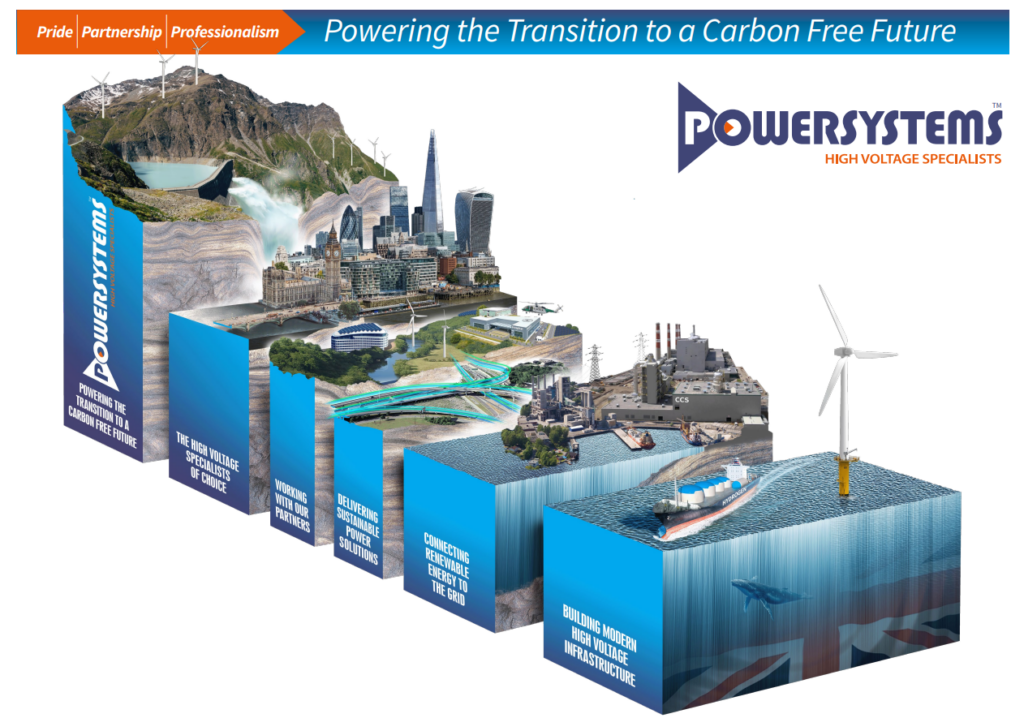Speak to Powersystems today
You can contact us as follows

Powering the transition to a carbon free future
Powering the transition to a carbon free future whilst continuing to ensure grid stability, energy security and affordability is one of the greatest challenges of our time.
The energy system is changing rapidly. The UK’s net zero decarbonisation targets are accelerating the growth of new low carbon energy sources. Energy demands are changing as consumers choose new technologies for heat and transport. And smart technology and digitalisation is driving a change in how consumers interact with energy.
The electricity generation sector has seen the most progress made on decarbonisation, particularly in recent years. It started with the ‘dash for gas’ in the 1990s that saw natural gas displacing coal fired generation and continued more recently with the rapid growth in renewables.
Today’s electricity mix is made up primarily of gas, renewables and nuclear, supplemented by a few other sources.

Renewable generation capacity, primarily wind and solar, has increased fivefold over the past 10 years. This growth has been supported by government subsidies, such as the Feed-In Tariff and the Contracts for Difference scheme but has also been driven by rapid reductions in cost that have allowed them to start competing in a subsidy-free environment.The latest auction for leases to operate offshore wind sites was held this year. Successful bids were for sites which could deliver a further 8 GW of offshore wind capacity to help meet the government’s target of delivering 40 GW of offshore wind by 2030.
The role of electricity generation within the whole energy system is changing. Historically it has been to deliver sufficient energy to meet demand and security of supply, however in future the electricity system will be supply-led, with renewable generators producing electricity when it is sunny or windy and flexible sources of demand adjusting to use and store this energy.
Decarbonisation of the electricity system enables the decarbonisation of other sectors. Without decarbonisation of electricity, changes made by consumers such as use of electric vehicles and electrified home heating would not lead to a net reduction of emissions.
Moving to a sustainable energy system requires the deployment of new technologies, many of which like carbon capture and storage technologies, nuclear 3rd and 4th generation, hydrogen, wind – deep offshore, floating offshore solar, marine energy, tidal, wave and barge are expected to deliver significant carbon emission reductions.
Technology deployment
A range of technologies is likely to be used in the transition to 2050, however the road map to the destination has its uncertainties and unknowns. Resolving these uncertainties requires years and in some cases decades of work, moving a technology from test bed to deployment at scale can also take a long time and with 28 years away to our target date we are under pressure to safeguard our environment for future generations.
However, rapid deployment is essential to meet emission reduction targets and allow new technologies to make a further impact.
Innovation in technologies
Innovation in technologies is a critical factor when considering the transition of the energy system over the coming decades. Scenarios of the UK’s future energy system are not predictions but set out possible paths and options. The Future Energy Scenarios (FES) 2021 outlines four different credible pathways for future energy between now and 2050. FES can be used to inform a range of energy system activities including network operation, investment decisions and energy policy.
Demonstrate
Large scale, strategic, demonstration activities are needed over the next decade, which need to be commissioned now. This applies across the energy spectrum and includes electricity generation, transport, and the built environment. Programmes are already underway. However, the scale needs to be increased over the coming years so that decisions which may affect the long-term future of the energy system can be taken with the best information available.
We believe decarbonising energy is possible but also that it will be complex, not least because there are many ways to reach net zero, each with their own trade-offs.

Powersystems engineering disciplines
As part of the energy system transformation, Powersystems are delivering new renewable energy infrastructure projects which form part of the balanced mix of technology required for the future of the energy Eco structure delivering significant carbon reductions in the UK.
You can contact us as follows